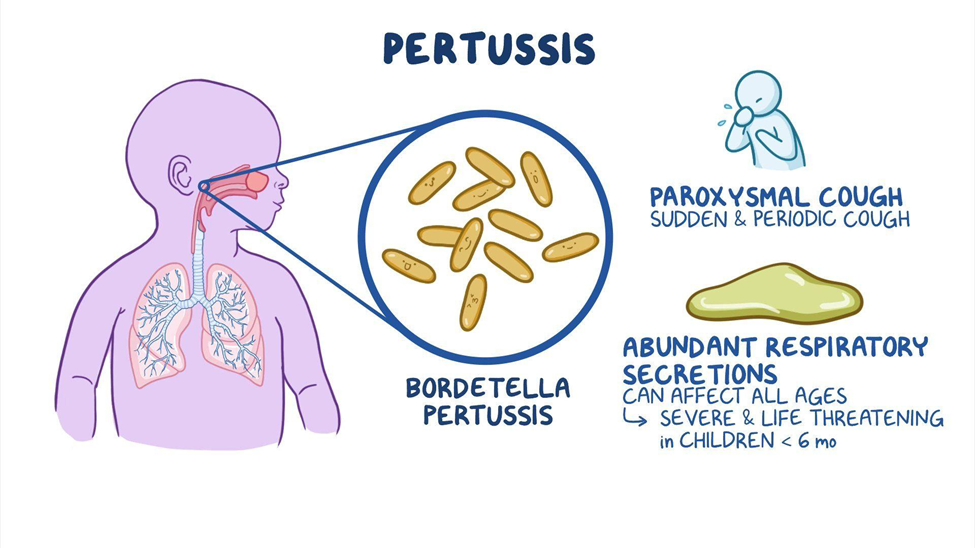The nurse performs an assessment of a child with pertussis (whooping cough). Which finding would the nurse identify as indicative of a potential complication?
A urinary output of 30 mL/hr
A white blood cell (WBC) count of 10.000 mm3 (10×109/L)
Decreased breath sounds in the lung bases
A weight gain
The Correct Answer is C
A. A urinary output of 30 mL/hr
Explanation: While decreased urinary output may indicate dehydration, it is not a specific finding related to pertussis. Dehydration can occur due to inadequate fluid intake or loss through vomiting or sweating.
B. A white blood cell (WBC) count of 10,000 mm3 (10×10^9/L)
Explanation: An elevated white blood cell count is a common finding in infections, including pertussis. It reflects the body's immune response to the infection. A WBC count of 10,000 mm3 is within the normal range, and while it indicates an inflammatory response, it does not specifically point to a complication.
C. Decreased breath sounds in the lung bases
Explanation:
Pertussis is a respiratory infection caused by the bacterium Bordetella pertussis. Complications can arise, including pneumonia. Decreased breath sounds in the lung bases may suggest the presence of pneumonia, which is a serious complication of pertussis. Pneumonia can lead to respiratory distress and requires prompt medical attention.
D. A weight gain
Explanation: Weight gain is not typically associated with pertussis. In fact, respiratory distress and difficulty feeding during coughing paroxysms can lead to weight loss in infants with pertussis. Weight gain may be indicative of other unrelated factors.

Nursing Test Bank
Naxlex Comprehensive Predictor Exams
Related Questions
Correct Answer is ["800"]
Explanation
The Parkland formula is commonly used to calculate the fluid requirements for burn resuscitation. The formula is:
Fluid requirement (in mL)=TBSA×Weight (in kg)×Fluid volume (in mL/kg)
For burn patients, the recommended fluid volume is typically 4 mL/kg for each percent of TBSA burned.
Let's calculate the fluid requirement for the given case:
Fluid requirement=40%×22 lbs×4 mL/kg
First, convert the weight from pounds to kilograms:
Weight (in kg)= Weight (in lbs)/2.2
Weight (in kg)=22 lbs/2.2≈10 kg
Now, calculate the fluid requirement:
Fluid requirement=40% x 10 kg × 4 mL/kg
Fluid requirement=1600mL(totalfluidover24hours)
Fluid for the first 8 hours:
1600/2=800ml
Thus, the child will receive 800 mL of fluid in the first 8 hours after the burn injury.
Correct Answer is D
Explanation
A. Valley fever
Explanation: Valley fever is a respiratory infection caused by inhaling spores of the Coccidioides fungus. It is not related to tinea pedis.
B. Shingles
Explanation: Shingles is a painful rash caused by the varicella-zoster virus. It is not related to tinea pedis.
C. Fever blister
Explanation: A fever blister is another term for a cold sore, typically caused by the herpes simplex virus. It is not related to tinea pedis, which is a fungal infection of the feet.
D. "Athlete's foot"
Explanation:
Tinea pedis is commonly known as athlete's foot. It is a fungal infection that affects the skin of the feet, particularly the spaces between the toes. The condition is often associated with warm and moist environments, such as those found in athletic shoes, hence the term "athlete's foot."
Whether you are a student looking to ace your exams or a practicing nurse seeking to enhance your expertise , our nursing education contents will empower you with the confidence and competence to make a difference in the lives of patients and become a respected leader in the healthcare field.
Visit Naxlex, invest in your future and unlock endless possibilities with our unparalleled nursing education contents today
Report Wrong Answer on the Current Question
Do you disagree with the answer? If yes, what is your expected answer? Explain.
Kindly be descriptive with the issue you are facing.
